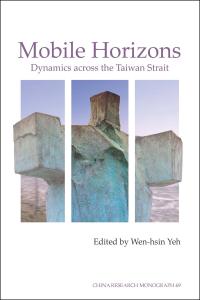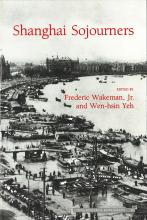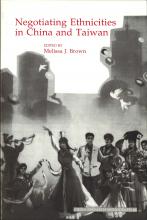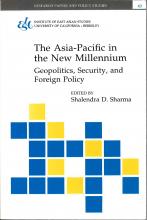Mobile Horizons
Mobile Horizons
Wen-hsin Yeh, ed.
What is the Taiwan Strait and why does it matter? The contributors to this volume argue that cross-Strait issues are both pressing subjects in contemporary politics and opportunities to reveal new vistas of scholarship covering China-Taiwan studies. Their research examines the dynamics of cross-Strait exchanges in national, regional, local, and transnational contexts, engaging with the arenas of culture, society, economy, and politics.
As a nonprofit academic press, we need your support to publish our books. Your gift can help us make more of our titles available as e-books. DONATE NOW
Title information
What is the Taiwan Strait and why does it matter? The contributors to this volume argue that cross-Strait issues are both pressing subjects in contemporary politics and opportunities to reveal new vistas of scholarship covering China-Taiwan studies. Their research examines the dynamics of cross-Strait exchanges in national, regional, local, and transnational contexts, engaging with the arenas of culture, society, economy, and politics. The actors in these essays range from coastal fishermen, mainland brides, local councilmen, religious pilgrims, revisionist historians, political activists, newspaper professionals, and American students to policy makers and billionaire executives.
Without marginalizing the role of the state, this volume argues that cross-Strait relationships involve non-state actors who act on norms and expectations of the past and the present--remembered as well as reconstructed--and on local as well as international levels. These relations are, further, concerned with issues of identity and interest. only by taking into full account the shifting alignment of these interactions can one place the actions of the states in context.
Mobile Horizons offers a valuable snapshot of what established experts and younger students are thinking about Taiwan and cross-Strait relations today.
List of contributors:
Lowell Dittmer (Professor of Political Science, University of California, Berkeley)
Sara L. Friedman (Associate Professor of Anthropology and Gender Studies, Indiana University)
Thomas B. Gold (Professor of Sociology, University of California, Berkeley; Executive Director, Inter-University Program for Chinese Language Studies)
William C. Kirby (T. M. Chang Professor of China Studies, Harvard University; Spangler Family Professor of Business Administration, Harvard Business School)
Micah S. Muscolino (Associate Professor of History, Georgetown University)
Shelley Rigger (Brown Professor and Chair of Political Science, Davidson College)
Michael Szonyi (Professor of Chinese History, Harvard University)
Robert P. Weller (Professor of Anthropology, Boston University)
Timothy B. Weston (Associate Professor of History, University of Colorado)
Yu-shan Wu (Distinguished Research Fellow, Institute of Political Science, Academia Sinica)
Wen-hsin Yeh (Richard H. & Laurie C. Morrison Professor of History, Walter & Elsie Haas Professor of Asian Studies; Director, Institute of East Asian Studies, University of California, Berkeley)
Wen-hsin Yeh, ed.
Wen-hsin Yeh is professor of history at the University of California, Berkeley. She has served as the director of the Institute of East Asian Studies and the chair of the Center for Chinese Studies at Berkeley. She has edited and contributed to many IEAS publications, including Mobile Subjects; Mobile Horizons; History in Images; Cities in Motion; Empire, Nation, and Beyond; Cross-Cultural Readings of Chineseness; Landscape, Culture, and Space in Chinese Society; and Shanghai Sojourners.
B.A., History, National Taiwan University; M.A., History, University of Southern California; Ph.D., History, University of California, Berkeley
Mobile Horizons
Acknowledgments — vii
Introduction: Of War and Peace: History and Perspectives — 1
Wen-hsin Yeh
- 1. What Drives the Cross-Strait Rapprochement? Political Competition, Globalization, and the Strategic Triangle — 25
Yu-shan Wu and Lowell Dittmer
2. Redefining “China”: From the China Inside to the China Outside — 48
Shelley Rigger
3. Shifting Frontiers: Cross-Strait Relations in the Context of Local Society — 74
Michael Szonyi
4. Underground at Sea: Fishing and Smuggling across the Taiwan Strait, 1970s–1990s — 99
Micah S. Muscolino
5. The Religious Dynamics of Region and Nation across the Strait — 124
Robert P. Weller
6. Mobilizing Gender in Cross-Strait Marriages: Patrilineal Tensions, Care Work Expectations, and a Dependency Model of Marital Immigration — 147
Sara L. Friedman
7. Global Business across the Taiwan Strait: The Case of the Taiwan Semiconductor Manufacturing Company Limited — 178
William C. Kirby
8. Taiwanese Newspapers and Politics in China’s Shadow — 208
Timothy B. Weston
9. Complex Characters: Relearning Taiwan — 235
Thomas B. Gold
10. A Quiet Revolution: Oppositional Politics and the Writing of Taiwanese History — 259
Wen-hsin Yeh
Glossary — 287
Bibliography — 293
List of Contributors — 317
Index — 319
|
JOURNAL REVIEWS |
|
"[T]his book exposes the role of non-state actors in, and the intercrossed, interwoven, multifaceted and evolving aspects of, cross-Strait relations. It will be a very useful work to graduate students, scholars, diplomats and businessmen studying or engaged in international relations, especially involving cross-Strait relations." ~C.X. George Wei, University of Macau, in Pacific Affairs 88, no. 4 (Dec 2015): 915-917. (http://www.pacificaffairs.ubc.ca/book-reviews/book-reviews-2/recent-book-reviews/book-reviews-vol-88-no-4/#mobilewei) |




